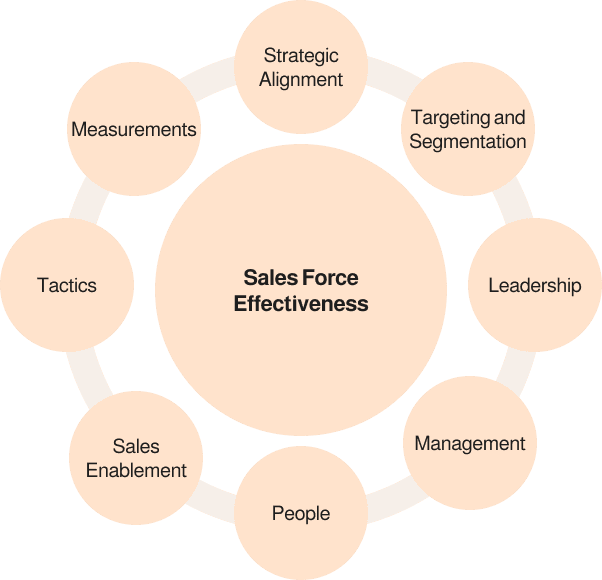Sales Force Effectiveness Framework
Optimize the efficiency, productivity, and overall performance of your sales team
The framework involves aligning various elements, from leadership and management to tactics and measurements, to achieve the company’s sales objectives effectively.

Maximize the impact of your sales
efforts on business growth
Saleforce effectiveness is achieved by cohesion of people, practices, and management aligned with the over-arching business objectives.
Components of Sales Force Effectiveness
Short and long-term decisions made in the sales department need to be driven by strategic alignment with the company’s go-to-market strategy and overarching business objectives.
Strategic Alignment with:
- company strategy
- business objectives
- product/service direction
- marketing direction
Questions to ask:
- Does the company have a clearly defined go-to-market strategy and articulated business objectives?
- Are the company strategy and overarching business objectives clearly understood by the sales department?
- Does the sales department have an articulated strategy that aligns with and supports the organization’s strategy?
- What decisions made in the sales department are misaligned with organizational objectives?
- Are the priorities, tactics, and capabilities deployed by sales management aligned with the company’s business objectives?
- Can your existing sales leadership and management articulate their strategy?
Sales teams need a leader who can guide them to deliver results that support the company’s objectives. Leaders must provide strategic direction, role modeling, internal advocacy, and support to the team that inspires them.
Leadership Deliverables:
- Clearly articulated vision and direction that aligns with the company’s over-arching strategic plan
- Inspiration and motivation
- Support for learning and development
- Reciprocal, constructive feedback
- Effective sales force and reliable results
Questions to ask:
- Can the existing sales leadership team state clearly what the company’s strategy is and how decisions made at the department level are in support of the strategy (i.e. sales force organization, market segmentation, tactics and measurement decisions)?
- Are there any leadership gaps that need to be addressed to provide the sales team with the direction, support and ongoing development required for their success?
Does the existing sales department have the organizational structure, capabilities, drive, adaptability, business acumen and learning culture required to perform now and into the future?
People Capabilities:
-
Team Structure
- Reporting Structure, Role definition, Capabilities
- Capabilities & predisposition for account acquisition and market growth
- Capabilities & predisposition for account optimization and retention
- Administrative and sales operations support to optimize performance
-
Learning and development culture
- embracing new technology critical for performance
- adaptation to changing buyer behavior
- adaptation to changing market conditions
Questions to Ask:
- Does the existing sales department possess all the capabilities needed to effectively execute the department strategy?
- If important gaps are present, can we develop the capabilities with our existing staff or do we need to acquire new talent?
Sales tactics are the tangible, everyday drivers of sales effectiveness. Step one is choosing the right set of tactics that are needed to accomplish the department’s objectives. Step two is effective execution in a manner that is valued by the customers and target customers of the firm while supporting the company’s brand among all audiences.
Tactics must be prioritized with resources focused on the right targets. Targets can be ranked by considering factors such as revenue and profit potential, strategic benefit, revenue potential, sales cycle and cost of acquisition.
Tactics:
- Alignment with departmental goals
- Targeting and Segmentation
-
New account acquisition
- approach and messaging
- Optimization for acquiring new vs managing existing accounts
- Time Management and Priorities
-
Account management
- Account optimization
- Risk mitigation
- Relationship management
Questions to ask:
- Is the current set of sales tactics being deployed by the sales department the best tactics to achieve departmental goals?
- Does tactical execution follow a reliable process and regular cadence to achieve the desired results?
- Are tactics deployed with the skill that is relevant and compelling to the customer and prospective customer audiences?
The selection and prioritization of target market segments, channel partners and strategic accounts profoundly impact sales effectiveness, business health, and strategic positioning.
Making the right decisions impact velocity, profitability, market leverage and positioning, enterprise value and long term business viability.
Segmentation priorities must be driven by several criteria.
The following questions regarding segmentation relate to industries, market segments, channel partners, and key accounts.
Questions to ask:
- Which segments are most willing to pay for your solutions?
- Which segments can be serviced the most profitably?
- Which segments are most accessible?
- Which segments fit your growth model?
- Which segments fit your product/service road map?
- Which segments will you have the most durable competitive advantage with?
- Which segments will you have the most negotiation leverage with?
To be truly effective, sales management must be skilled in a variety of interdependent disciplines including financial acumen, organizational development, performance management, and forecasting and pipeline management.
Sales Management Disciplines:
- Organizational Development
- KPIs and reporting
- Financial Analysis, Actionable Insights, Forecasting
- Pipeline Management
- Incentives/Compensation Management
- Performance Management
Questions to ask:
- Are there any sales management gaps that need to be addressed to ensure that the sales department is delivering maximum results for the organization?
There is exponential growth in the variety of powerful AI tools as well as traditional systems sales organizations can use to increase effectiveness, productivity and market relevance.
Having the right suite of tools can provide a professional sales team with a competitive advantage, enhance productivity and provide greater value to all stakeholders that the sales departments interact with.
The number of tools available could easily overwhelm the sales force and the financial cost to the organization could be considerable.
Careful selection, adoption and training are required to maximize the benefits while controlling costs.
Tools and Enablement:
- ERP / CRM
- Enablement: Content, Collateral, Pricing, Administration
- AI Sales Tools – Prospecting, Research and Insights
- Account Based Marketing
- SaaS Productivity
- Social Media
Questions to ask:
- Does the sales department have the tools required to be efficient and effective?
- Is the company paying for tools that are underutilized or creating clutter and inefficiencies?
- Has the sales team fully adopted the tools? If not, why?
- Does the sales team have adequate training on the tools?
Tracking too many or too few KPIs or the wrong KPIs impedes developing a clear, actionable analysis of the sales effectiveness of a sales organization and can lead to frustration and motivation issues. KPIs should be aligned with company objectives, be clearly understood and be tied to accountabilities that are controllable (to the maximum extent possible) by the sales department.
Measurement Considerations:
- Only track KPIs that will provide meaningful, actionable insight directly related to the company’s overarching goals
- Choose KPIs that track both lagging and leading performance indicators
- There should be KPIs that track both lagging and leading indicators of performance
- KPI’s
Understanding and implementing Sales Force Effectiveness empowers companies to drive revenue, build strong customer relationships, and establish a competitive edge in their industry.
Experience Sales Force Effectiveness in Action with Provoke
Kostklip
Services Provided
Consulting / / Gap Analysis / Recruiting / Organizational Design / Territory Design / Management & KPI Design / Compensation
The Sales Effectiveness Challenge
Kostklip, a manufacturer of store merchandising systems, experiences successive challenges in sales leadership and management and as a result, flat to declining sales over the years. Kostklip needed a robust overhaul of their sales organization and pipeline management process.
The Solution
I helped select a VP of Sales and then implemented a sales methodology that included Miller Heiman consulting, a sales management system, a change in organizational structure and new performance metrics and management processes. This resulted in a return to double-digit growth in subsequent years.

John Philippson
CEO
Kostklip
“The final report was professional and very comprehensive. We have begun implementing the recommendations…I have since engaged Eric in a second contract to monitor and assist with the full implementation of the sales plan…”
Parasol
Services Provided
Consulting / / Go-to-market strategy / Channel Development / Investor Relations / Pricing Model / Marketing Strategy
The Sales Effectiveness Challenge
Parasol had developed and patented a novel solution for entertainment lighting, but production companies would not offer it to their clients due to the high transportation costs, capital costs, and lack of proven market demand and loyalty to existing systems.
The Solution
I changed the sales targets from the supply chain (buyers) to the end users (influencers), i.e., lighting designers. I created a direct sales and social media strategy campaign that appealed to the lighting designer’s need for a competitive advantage. The demand we created convinced the supply chain to support Parasol, resulting in sales in Europe, Asian and the US.

Herman Fruhm
CEO
Parasol
“Eric has demonstrated very high levels of professionalism, communication skills, strategic thinking and creativity. I am happy to recommend Eric to any organization that requires a top caliber professional”